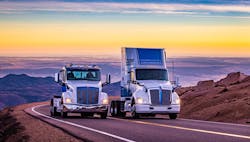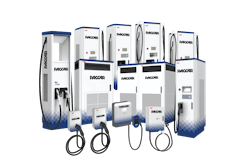ABB, PACCAR Partner to Support EV Trucks With Innovative Charging Solutions
A global leader in the design, manufacture, and customer support of high-quality premium trucks, PACCAR is partnering with ABB to offer dealers and customers with advanced charging solutions for EV trucks across North America and Europe.
According to the EPA, medium and heavy-duty trucks account for approximately 25% of the total greenhouse gas emissions from the transportation sector in the U.S. alone.
The EVs have batteries powerful enough for Peterbilt, Kenworth, DAF CF Electric, and LF Electric truck models that require on-demand fast charging for the short trips of their fleet routes.
“We are pleased to partner with ABB to bring this outstanding solution to our customers and dealers on a global scale,” said John Rich, PACCAR Chief Technology Officer.
“Customers will receive the industry-leading operating efficiency and environmental benefits of Peterbilt, Kenworth, and DAF zero-emissions truck models, combined with ABB’s market-leading EV charging technology.”
According to ABB, its charging systems help optimize fleet charging with high-power, quick charge breaks or lower power, load-managed overnight charging for longer-haul routes and last-mile delivery.
“Pairing ABB, a global leader in fleet electrification, with PACCAR, one of the largest manufacturers of medium and heavy-duty trucks, is a strategic and sustainable partnership that will accelerate e-fleet expansion and adoption as well as reduce carbon and noise emissions in the transportation sector,” said Frank Muehlon, President of ABB’s E-mobility division.
Committed to sustainably serving customers, all PACCAR manufacturing locations are ISO 14001 certified and more than 80% are zero-waste-to-landfill.
In the same vein, ABB says it is progressing toward circular operations and carbon neutrality through electrifying its fleets, sourcing 100% renewable electricity, and improving energy efficiency across its sites—all by 2030.
About the Author
Laura Davis
Editor-in-Chief, New Equipment Digest
Laura Davis is the editor in chief of New Equipment Digest (NED), a brand part of the Manufacturing Group at EndeavorB2B. NED covers all products, equipment, solutions, and technology related to the broad scope of manufacturing, from mops and buckets to robots and automation. Laura has been a manufacturing product writer for eight years, knowledgeable about the ins and outs of the industry, along with what readers are looking for when wanting to learn about the latest products on the market.

